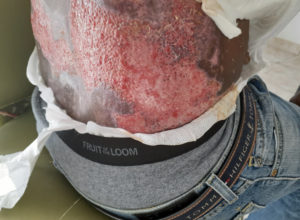

NASSAU-An acid attack victim feels betrayed by the courts after his attacker escaped punishment.
Sterling Pratt saw his life flash before his eyes when his now former girlfriend Minique Bowe-Wyles, 37, poured acid down his back on December 15, 2019.
Pratt said, “I felt I was going to die. I didn’t think I would make it.”
The incident left the 40-year-old physically scarred, with second and third-degree burns to 24 percent of his body.
The attack marred the Christmas holidays for his daughters, ages 11 and 12. Rather than celebrating, Pratt’s girls became his nurses and changed the bandages that stuck to his flesh.
He still experiences excruciating pain due to damage to his nerves and lungs.
But the failure of courts to deliver justice has left Pratt “devastated.”
Bowe-Wyles pleaded guilty to causing grievous harm to Pratt at arraignment.
Magistrate Ambrose Armbrister sentenced Bowe-Wyles to probation for four months and ordered her to pay Pratt $50,000 in compensation. Failure to pay the money would result in three months in prison.
The magistrate made the compensation order on the suggestion of Bowe-Wyles’ lawyer Ian Cargill. Pratt’s lawyer, Romona Farquharson-Seymour, was present and agreed.
In court, Bowe-Wyles agreed to pay the compensation in monthly instalments of $5,000 until November 2020.
Despite this, Pratt never received a dime.
APPEAL
Last month, the Court of Appeal overturned the magistrate’s compensation order.
Bowe-Wyles appealed her conviction and sentence two days after her guilty plea.
Her new lawyer Krysta Mason-Smith had asked the court to vacate the guilty plea, arguing that it was made on the advice of Cargill.
However, the appellate court said it couldn’t interfere with the conviction because the plea was unequivocal.
But the court said the magistrate didn’t have the power to make the order for compensation.
In delivering the decision, Sir Michael Barnett said, “The record does not in fact reflect any formal application made by the virtual complainant to the court for compensation.
“That application must, in our view, be a proper application to the court.”
Pratt told Bahamas Court News that he feels “bamboozled.”
Pratt could have made the application for compensation since he attended the arraignment.
He recalled, “I was right there in the second row with my bandages oozing.”
Despite the agreement of counsel, Sir Michael said that the record didn’t show that the magistrate considered the scope of the injuries before arriving at the figure.
Additionally, Sir Michael said the magistrate exceeded his jurisdiction by imposing a three-month penalty for not paying compensation.
Sir Michael said, “This was beyond the jurisdiction of the magistrate and leads to the inference that the sum of $50,000 may well have been a punishment rather than an order for compensation.”
The Court did not interfere with the probation order.
Based on the Court’s decision, magistrates routinely disregard the law concerning compensation orders. The orders are made without formal requests from the victim, and the default sentences exceed one month in prison.
Now, Pratt has to sue Bowe-Wyles for personal injury.
It will be difficult because the burn injuries have left him unable to work.
DEVASTATED
According to Pratt, a row over dropping a coworker home resulted in his life-changing injuries.
Pratt said Bowe-Wyles accused him of disrespecting her after gave an elderly coworker a ride from the Lyford Cay Club to Kemp Road. The woman in her 60s had missed the company’s bus, he said.
He said Bowe-Wyles threw acid on his car before pouring the corrosive substance down his back.
He feels police mishandled his case from the start.
According to him, police initially recorded that he did not want to press charges.
Secondly, they didn’t even collect the acid bottle as evidence.
Bowe-Wyles might have a conviction but she can go on with her life.
The former basketball coach can no longer participate in the activity. He is also unable to work out with his daughters.
Pratt said, “They ask their daddy to go running, like they were accustomed to, but I can’t run as long as I used to.”
Pratt said, “The Court of Appeal decision makes me feel devastated because had I done this, the sentence would probably be way different. I feel like crying almost every night. I just want full justice.”














